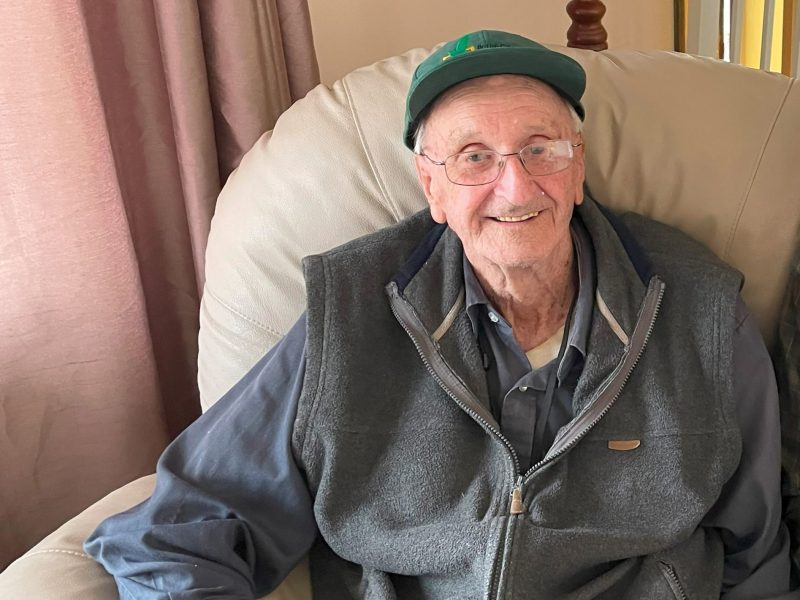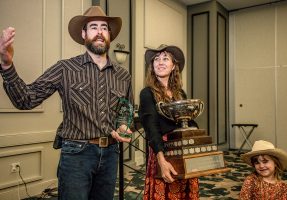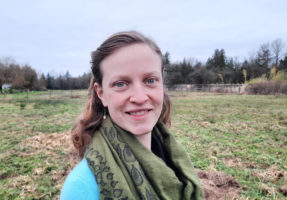CHETWYND – Mention the name Charlie Lasser within organic farming circles and stories about ingenuity and having a vision for the future will abound.
The 92-year-old Chetwynd farmer and rancher passed away on December 9, 2023, but left an indelible mark in his wake on younger farmers and others in the industry.
“As a young farmer, the challenges that we’re facing and getting started up and everything, he really inspired me with his dedication,” says Tristan Banwell of Spray Creek Ranch near Lillooet. “To be in his 90s and be dreaming and planning, we can only hope that’s where we’ll be at that age.”
Banwell was fortunate to get to 5,200-acre Lasser Ranch to interview Lasser in spring 2023 for a virtual tour as part of the Organic BC field day series (the video is available at [https://bit.ly/3w3aAiM]).
The tour was meant to focus on Lasser’s seaweed feed program for his beef cattle, but Lasser drove Banwell around the property for hours, talking about numerous aspects of the operation. It’s something Banwell relishes to this day and will for years to come.
“I’m so fortunate to have met him and seen his farm,” Banwell says. “Being there and driving around with him, it was a very special thing to experience.”
While meeting Lasser was an experience, Lasser himself had a wealth of it. But that’s to be expected when someone has farmed their land for more than 50 years and is curious enough to keep improving.
Lasser and his late wife Edith moved to Chetwynd in the mid-1970s after farming in Pitt Meadows for about 20 years, where Lasser had been a municipal councillor. Up north, he served as mayor of Chetwynd, was a board member for numerous organizations, a Lion’s Club member and at his death had more than 600 head of cattle and more than 1,650 acres, mostly in forage crops.
Genuine is the word Pacific Agriculture Certification Society executive director Verna Wagner chooses to describe Lasser. He was treasurer of the society for a decade.
“I was in communication with him quite a bit. That’s how we built our relationship,” she says. “I remember Charlie telling me that he was farming organic from basically the day he was born. He said he was organic before organic was a word.”
That history gave Lasser a “bone of contention” with the word conventional, according to Wagner.
“In his mind, organic should have actually been called conventional,” she says. “Organic was the means of farming since the beginning of time.”
Lasser came from a long line of Swiss dairy farmers and was proud of both his lineage and the experiences he gained in his youth.
Wagner also describes him as very wise, “not just because of his age,” and social.
“He loved to laugh. He was a real storyteller,” she says. “He always had a kindness about him to be able to help people that needed help.”
Helping others was Lasser’s way, and even into his late 80s he was making his way 1,000 kilometres or more south to attend Organic BC conferences, which is how Banwell met him and grew to appreciate his input and wisdom.
Lasser would attend educational sessions and wait for the Q and A portion to share his own insights and questions on the various topics presented.
Lasser’s constant desire to learn and try new things was apparent to Marcel Schulze, who got his start as Lasser’s ranch hand about 10 years ago. Schulze came to the farm not knowing much about beef ranching, but absorbed knowledge from Lasser and other sources.
“We were very close. Out of work even, too,” Schulze says. “I was with him every day. I was over there making dinner for him. Just hanging out … talking about cows. Talking about what he wanted to do. It was a good, fun time.”
Schulze says Lasser always had big ideas and wanted to try new things he’d come up with himself. Over the years, the two would discuss plans more often, determining the best way to approach things and assessing if an idea was worth trying out or not.
Schulze credits Lasser for giving him confidence.
“I’m glad that Charlie was bringing me into it. I wouldn’t trade it for anything else,” he says.
Lasser had a 20-year plan ahead of him when he died. He’d told many people, Banwell included, that when he was younger, he thought he’d work to 100, then retire and travel.
Perhaps his purpose on the farm is what allowed him to live to be a nonagenarian. Perhaps it was that he continued trying to solve problems he came upon.
“Okay, you go ahead, you got a problem. So, you look at it, you come up with an idea and it doesn’t work. That doesn’t mean it’s a loss,” Lasser said in his interview with Banwell. “That’s part of a success, ‘cause now you got one less thing to worry about. You know that won’t work, so you try the next one and by the time you try your third one, you’ve got an answer. Don’t get discouraged because it doesn’t work immediately.”
Altruistic
Wagner says Lasser’s contributions through organizations like PACS have been altruistic.
“He’s done so much for the organic industry and PACS throughout the years,” she says. “He’s done it just to be a contributor without any expectations. Just totally heartfelt. He was a very selfless person. Just a pleasure to be around.”
She noted how his innovations in seaweed were driven by an interest in reducing carbon emissions. He also tried to find ways to encourage cows to eat Canada thistle so they would include it in their grazing rather than ignore it.
“He was old school. Everything was paper and fax machine,” she says. “But as far as cattle and ranching, he was very open-minded and creative.”
PACS gave Lasser a plaque last year to recognize his contributions to the organization and its members.
Lasser’s son Bob has taken over as ranch manager, and Schulze will continue on as ranch hand. They have already acquired some Gelbvieh bulls to begin increasing the size of their future animals. It’s a progression of the land that meant so much to Lasser. His son and Schulze are working together to create a new vision for the ranch.
Lasser summarized what mattered most to him in his video interview with Banwell.
“The important thing is, in life, that you help other people,” he said. “People don’t realize, some of these [committees and organizations] I’ve been on, the reason I’m on there was to help. If you can do that, then you’ve done your job.”




 Dairy demand prompts quota increase
Dairy demand prompts quota increase